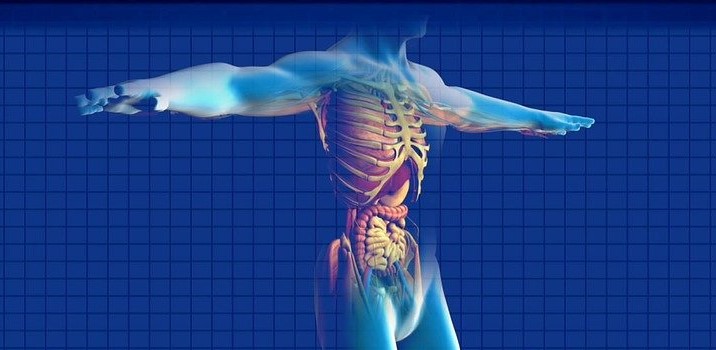Digestion and Stomach Acid

The digestive system is responsible for providing the body with energy and nutrients.
The digestive organs break down food into small nutrient molecules that are used to supply the body's energy needs, and also absorb the raw materials that are required for growth and repair. Mechanical digestion, such as chewing, breaks down food by physical action; chemical digestion uses digesting agents - gastric juices - called enzymes to break down food particles even further, which occurs throughout the system - even in the mouth. The digestive system secretes enzymes, intrinsic factors and gastric acids - necessary for proper digestion of food in the stomach, to break down and pre-digest the food we consume.
Eighty percent of carbohydrates are digested in our mouth when we chew. Without the enzymes to break down the carbohydrates, your foods begin to ferment in your intestinal tract, if we do not chew properly. If the food we eat is not digesting properly, painful gas, heart burn, acid reflux and other stomach problems can arise.
Stomach, gallbladder, and pancreas work together as a team to perform the majority of the digestion of food. The digestive system secretes enzymes, intrinsic factors and gastric acids - necessary for proper digestion of food in the stomach to break down and digest the food we consume. Gastric acids consist of hydrochloric acid, sodium chloride, potassium chloride and protein-digesting enzyme pepsin, with a pH of 1-2 in the lumen of the stomach. Secretion is induced by the smell, sight or the feel of food in the mouth.
Stomach Acid Imbalance
The condition of both low and excess stomach acid is highly uncomfortable and irritating. When the secretion of gastric acid increases or decreases in the stomach it leads to various stomach-related problems - resulting in discomfort, burning sensation, gastric ulcers and basic gastritis. Only about 1 in 10 people with acid problems actually do have too much stomach acid – the rest actually has insufficient stomach acids (hypochlorydia) or a different problem altogether such as a food intolerance.
Causes
One of the primary causes for stomach acid problems is the deficiency of vitamins and minerals needed for acid production and absorption. Poor dietary habits and malnutrition cause nutrient deficiency in our body. Stress - even in children, Adrenal fatigue, excessive alcohol, sugar and substance consumption also hinder the cells that produce gastric acids, while stress also contributes in decreasing or increasing the production of gastric acid.
Presence of bacteria; e.g. Helicobacter pylori inhibits the stomach ability to produce appropriate amounts of gastric juices - acids, often leading to conditions such as acid reflux problems.
Advancing age is also one of the causes for acid-related problems. HCl production decreases with age and the production capacity of a 50 year old individual is only one-fourth as compared to that of a 20 year old individual.
Most people have difficulty digesting food not because of too much stomach acid,
as we've been led to believe, but due to decreased stomach acid.
Insufficiency of stomach acid leads to indigestion, leaving food undigested in the stomach, where bacteria and other micro-organisms start to grow. This imbalance can hinder your body's ability to absorb nutrients, even if you eating healthy foods.
Long-term deficiency of nutrients can cause more serious health issues, mostly arising from weak immune system. All other symptoms that are associated with low stomach acid arise due to the presence of undigested foods in the stomach.
Symptoms of low stomach acid may include:
bloating, belching, burning and flatulence after meals, a feeling of fullness even after eating little or nothing, upset stomach; coupled with indigestion (diarrhea or constipation). Heartburn and/or gastric relux (sometimes too much HCL but most often not enough), bad breath, foul smelling stools, loose stools in the early morning, acne in adults, rosacea (dialated blood vessles on the cheeks and nose), pernicious anemia or iron deficiency, anal itching, nausea especially after taking vitamins and minerals, bacterial dysbiosis or infections in the gut, parasites - or at least increased susceptibility to parasitic infections, chronic yeast infections, asthma, food intolerance and allergy, fatigue. Another common symptom of poor digestion is vertical ridges in the nails, or nails which tend to split, peel or break easily.
The Baking Soda - Stomach Acid Home Test
While it is best to have low stomach acid diagnosed by a health care provider, a simple home test can help identify this condition. The purpose of this test is to give a rough indication as to whether your stomach is producing adequate amounts of hydrochloric acid. This test works by drinking baking soda and creating a chemical reaction in your stomach - between the baking soda (sodium bicarbonate) and hydrochloric acid (HCL). The result is burping caused by the produced ‘carbon dioxide’ gas.
Ingesting baking soda is an old school natural home remedy for upset stomachs. Many people choose to try this test first because it’s very safe, low cost and you can do it straight away if it’s in the cupboard.
It is recommend performing the test 3 consecutive mornings - before putting anything in your mouth - to find an average.
1. Mix 1/4 teaspoon of baking soda in ½ glass of water (4-6 ounces) first thing in the morning.
2. Drink the baking soda solution.
3. Time how long it takes you to belch. Time up to five minutes (5-15).
If you have not belched within five minutes stop timing.
In theory, if your stomach is producing adequate amounts of stomach acid you’ll likely belch within two to three minutes. (Though, note, that early and repeated belching or burps can occur from swallowing air when drinking the solution). Any belching, little or no belching - after 3-5 minutes suggests a low acid level. Because the time frames can vary from person-to-person, as well as how they drink the solution, this test is only a good indicator that you might want to do more testing to determine your stomach acid.
I have low stomach acid now what?
Untreated acidity problems can lead to stomach lining damage or gastric ulcers. Try to reduce the levels of stress and eating ‘on the go’. Eat small meals frequently and chew well. Make sure you include foods that are high in complex carbohydrates – avoiding sugar and white flour products. Drink plenty of water and fresh juices. Avoid: oily and stale food, alcohol and other carbonated drinks.
In the short term, you can supplement your acid levels to allow the rest of the digestive process to work properly.
Natural remadies include
Chewing propperly! Digestion starts in the mouth. If we do not chew properly and long enough our foods begin to ferment in our intestinal tract.
Digestive Bitters:
Bitters increase digestive secretions from the stomach, pancreas, liver and gallbladder. This leads to better digestive health. As we grow older our stomachs produce less acid. Chronic stress, can actually diminish the production of stomach acid (hydrochloric acid), while acute stress can cause the over-production of stomach acid. However, many people have insufficient stomach acid production.
It is thought that bitter herbs constituents (as tea or tincture) start their work by locally stimulating the bitter sensory response of taste buds in the mouth and throat. The best effects are seen with long-term use of bitters. They are usually ingested before meals in small amounts. This can be taken in the form of a single bitter herb as a tea or tincture prior to a meal; or as a complex herb powder or tincture. Some examples of bitter herbs include ginger and turmeric, greater celandine, wormwood, gentian, dandelion, milkthistle, yarrow, devil's claw, bitter orange, bitter melon, juniper, andrographis, prickly ash, and centaury.
Herbal bitter tinctures e.g. Digestisan Oral drops (A.Vogel) are effective in stimulating the release of gastric juices - best taken five minutes before a meal in a little water
Centaurium tincture (A.Vogel-Bioforce) rebalances stomach acid - evens it out if it’s too acidic or not acidic enough; and makes sure enzymes needed to digest protein properly are produced (helpful: acid reflux, hiatus hernia, and indigestion of upper digestive tract).
Yarrow Complex reduces bloating – from foods that didn’t ‘agree’. Most people experience these symptoms when their diet revolves around wheat, cheese and coffee. Yarrow reduces inflammation from irritating foods and calms spasms (indigestion, bloating, wind, food intolerances).
Cynara (Milkthistle) improves how the liver handles fat –helping that fats are being digested more efficiently, so you are less likely to get bloated. Aiding in good bowel movement and low cholesterol. (tendency to constipation, difficulty loosing weight, high cholesterol and chalky coloured stools).
Silicea Liquid calms inflammation and painful digestive tract by instantly putting a buffering layer over the gut lining – actively reducing inflammation and help heal any damage to the gut wall ( acid reflux, gastritis and diarrhoea).
Some people may need to supplement with Betaine HCL as a replacement for the low acid to get to the correct pH levels.
Betaine HCL Some people may need to supplement with Betaine HCL as a replacement for the low acid. Over time Betaine HCL will retrain your stomach to get to the correct pH levels. Long-term you may need to work on finding the root cause problem and taper off the supplements. But until then, Betaine HCL supplementation is a safe way to have great digestion and make sure your getting the nutrients you need from you foods. An indicator if Betaine HCL is right for you is when you feel nothing when taking it after a meal – and that your stomach is probably not producing enough hydrochloric acid. A normal response to taking Betaine HCL is a feeling of warmth in the stomach.
Liver Health Formula ( Nature's Sunshine) is a unique product that has been specially developed to help nourish the liver and aid digestion. This powerful combination contains eleven key ingredients chosen for their antioxidant, bitter, and soothing properties, all of which help to keep the liver in good condition. Ingredients include: Dandelion, Turmeric, Burdock, Gentian, Safflower, Fenugreek, Irish Moss, Algae, Slippery Elm, Uva Ursi, Chickweed, Catnip.
Mustard & mustard seeds are also excellent for your digestive system. If you are suffering from the problem of indigestion then mustard seeds can help to get rid of it. The seeds are also packed with fibre, which helps in easy bowel movement and enhances the digestive power of the body.
Digestive Enzymes
Digestive enzymes are proteins specially tailored to break down the foods we eat into nutrients that your body can then readily digest. Enzymes are substances that make life possible, and are needed for every chemical reaction that takes place in the human body. No mineral, vitamin or hormone can do any work without enzymes. Lack of digestive enzymes can be a factor in food allergies and may influence the health of the entire body.
Our modern diet is primarily made up of cooked and processed foods, - devoid of beneficial dietary enzymes. When we cook food (above 118 degrees), process or pasteurize it, we destroy its natural digestive enzymes. We must therefore rely on our bodies to produce most of the enzymes we need to help us break down and utilize the food we eat.
Naturally eating enzyme rich foods - chewed properly - would enter the stomach laced with digestive enzymes; predigesting our food for about an hour - breaking down app 75% of our meal. Hydrochloric acid and pepsin are only introduced after this pre-digestion period. Processing and cooking destroy enzymes in food, causing our foods to be severely enzyme deficient. When the secretion of gastric acid increases or decreases in the stomach it leads to various stomach-related problems - resulting in discomfort, burning sensation, gastric ulcers and basic gastritis.
Eighty percent of carbohydrates are digested in our mouth when we chew. Without the enzymes to break down the carbohydrates, your foods begin to ferment in your intestinal tract, if we do not chew properly. If the food we eat is not digesting properly, painful gas, heart burn, acid reflux and other stomach problems can arise.
Enzymes deliver nutrients, carry away toxic wastes, help to digest food, purify the blood, deliver hormones, balance cholesterol, feed the brain, strengthens of the immune system and cause no harm to the body.
Enzymes play a crucial role in the digestion process. Your digestive health (gut health) directly impacts the health of your brain and immune system. If your gut is in disarray, there’s a strong likelihood that your overall health is as well.
Foods High in Enzymes:
There are many fruits, vegetables and fermented foods that contain relatively high amounts of useful digestive enzymes. However, all foods need to be raw (or fermented) and never heated also not after fermentation.
Fruit: Papaya, Avocado, Banana, Cantaloupe, Dates, Figs, Grapes, Guava, Kiwi, Mango, Melons, Papaya, Pineapple, Saw palmetto berries.
Vegetables, Grains, and Herbs: Ginger Root, Aloe vera, Barley grass, Cucumbers, Garlic (raw), Olive oil, Olives, Onions (raw), Pau d'arco, Sprouted grains, Sprouts (According to Howell, sprouts contain the most enzymes when they are 1/2" long.), Wheat germ (raw), Wheatgrass juice.
Mushrooms: Shiitake Mushrooms, Maitake, Reishi
Cultured / fermented Foods: Cheese, Kefir, Yogurt, Other cultured dairy products, Sauerkraut (raw), Kimchee (raw), Pickled vegetables (raw), Natto, Miso, Soy sauce (traditionally made), Tempeh.
Animal Products: Bee pollen, Honey (raw), Royal jelly, Butter (raw and unpasteurized), Milk (raw and unpasteurized).
Algae and Sea Vegetables: Chlorella, Kelp (raw), Spirulina.
This information is provided for general guidance only and should not be treated as a substitute for medical advice. If you are concerned about any aspect of your health you should contact a health care professional, your GP or visit http://www.nhsdirect.nhs.uk
Medical Disclaimer: Information and statements regarding dietary supplements are not intended to diagnose, treat, cure, or prevent any disease or health condition. We make no medical claims as to the benefits of any of the suggestions to improve medical conditions, or recommend any supplement as a drug, or drug replacement. We always recommend that you work in conjunction with your primary medical advisor, or nutritionist/dietician, particularly if you have an existing medical condition, and that you do continue to take any prescribed medication.



